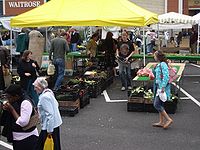
Photo from wikipedia
The purpose of this paper is to examine the role of local origin of food in the Hungarian population's decisions regarding food purchase and to identify under which conditions consumers… Click to show full abstract
The purpose of this paper is to examine the role of local origin of food in the Hungarian population's decisions regarding food purchase and to identify under which conditions consumers consider food to be a local product.,The study was based on a representative quantitative consumer survey (n = 1,000). Cluster analysis was used to define different consumer groups.,In general, consumers perceive that local products have positive characteristics that distinguish them from not locally sourced foodstuffs. The results prove that the accessibility of local food products differs to a great extent in towns and regions. In towns with local markets, the ratio of recognition and acceptance of local products is higher. Based on the attitudes and behaviour of respondents towards local products, five clusters were separated and described.,Although the sample's representativeness of three demographic factors was ensured, some general limitations resulted from the sampling methodology.,Based on the study findings, the authors encourage farmers' market operators to actively study the purchasing habits, attitudes and expectations of the consumer groups described in the study and to exchange information to promote the development of an economically successful local food supply system.,This empirical representative study is suitable to describe the knowledge, attitudes and behaviour of Hungarian consumers related to local food products. Consumer perception about local food varies internationally; therefore, national level studies are important to understand the viability of short food supply chains.
Journal Title: British Food Journal
Year Published: 2020
Link to full text (if available)
Share on Social Media: Sign Up to like & get
recommendations!